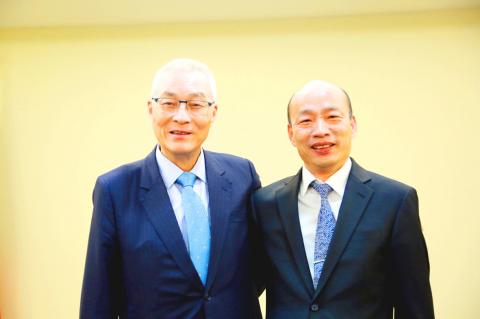Kaohsiung Mayor Han Kuo-yu (韓國瑜) yesterday struck a different tone on the Chinese Nationalist Party’s (KMT) presidential primary, saying that he would respect any arrangements made by KMT headquarters or the Central Standing Committee, including pitting him against other aspirants in a public opinion poll.
“Given the current situation, I cannot be included in opinion polls on the presidential election,” Han said. “As Kaohsiung mayor, I shoulder the expectations of Kaohsiung residents.”
“If party headquarters or the Central Standing Committee needs Han Kuo-yu in some way to make all kinds of arrangements, including opinion polls, I will respect” their decision, he said.

Photo: CNA
He made the remarks following a closed-door meeting with KMT Chairman Wu Den-yih (吳敦義) at party headquarters in Taipei.
He also thanked Wu, first for nominating him as KMT Kaohsiung chapter chairman and then the Kaohsiung mayoral candidate in last year’s local elections.
Han said that he, Wu, and KMT vice chairmen Hau Lung-bin (郝龍斌) and Tseng Yung-chuan (曾永權) agreed at the meeting that the party must concentrate all their strength and unite ahead of next year’s presidential election, thereby protecting the Republic of China.
Responding to reporters’ questions on whether he would be the KMT’s candidate if he emerged as the front-runner in polls, Han only said: “What I just said was something I have never said before.”
Asked whether he and Wu talked about other KMT members who have expressed an interest in joining the KMT primary or how the primary would be conducted, Han said the model for yesterday’s meeting would be followed by other potential candidates.
He denied that his relationship with Wu had soured, saying that he is on friendly terms with his “former boss,” with whom he had a cordial meeting.
Asked whether he would make any clearer move to make known his desire to join the KMT primary, he said that with the party’s nomination rules still in limbo, he could only respect KMT headquarters’ decisions.
KMT Organizational Development Committee director Lee Che-hua (李哲華) said that the party is inclining toward drafting primary rules that the race be solely based on opinion polls.
Wu is to meet separately in the coming days with former New Taipei City mayor Eric Chu (朱立倫), KMT Legislator Wang Jin-pyng (王金平), Hon Hai Precision Industry Co (鴻海精密) chairman Terry Gou (郭台銘) and former Taipei County commissioner Chou Hsi-wei (周錫瑋), all of whom have publicly stated their intention to take part in the primary, to seek their opinions on the primary rules, Lee said.
The primary rules and schedule could be passed by the Central Standing Committee by the middle of this month, while the KMT’s presidential candidate could be selected in early July and approved during the KMT National Congress on July 28, he added.
Additional reporting by Shih Hsiao-kuang

Intelligence agents have recorded 510,000 instances of “controversial information” being spread online by the Chinese Communist Party (CCP) so far this year, the National Security Bureau (NSB) said in a report yesterday, as it warned of artificial intelligence (AI) being employed to generate destabilizing misinformation. The bureau submitted a written report to the Legislative Yuan in preparation for National Security Bureau Director-General Tsai Ming-yen’s (蔡明彥) appearance before the Foreign Affairs and National Defense Committee today. The CCP has been using cognitive warfare to divide Taiwanese society by commenting on controversial issues such as Taiwan Semiconductor Manufacturing Co’s (TSMC, 台積電) investments in the

HELPING HAND: The steering committee of the National Stabilization Fund is expected to hold a meeting to discuss how and when to utilize the fund to help buffer the sell-off The TAIEX plunged 2,065.87 points, or 9.7 percent, to close at 19,232.35 yesterday, the highest single-day percentage loss on record, as investors braced for US President Donald Trump’s tariffs after an extended holiday weekend. Amid the pessimistic atmosphere, 945 listed companies led by large-cap stocks — including Taiwan Semiconductor Manufacturing Co (TSMC, 台積電), Hon Hai Precision Industry Co (鴻海精密) and Largan Precision Co (大立光) — fell by the daily maximum of 10 percent at the close, Taiwan Stock Exchange data showed. The number of listed companies ending limit-down set a new record, the exchange said. The TAIEX plunged by daily maxiumu in just

INVESTIGATION: The case is the latest instance of a DPP figure being implicated in an espionage network accused of allegedly leaking information to Chinese intelligence Democratic Progressive Party (DPP) member Ho Jen-chieh (何仁傑) was detained and held incommunicado yesterday on suspicion of spying for China during his tenure as assistant to then-minister of foreign affairs Joseph Wu (吳釗燮). The Taipei District Prosecutors’ Office said Ho was implicated during its investigation into alleged spying activities by former Presidential Office consultant Wu Shang-yu (吳尚雨). Prosecutors said there is reason to believe Ho breached the National Security Act (國家安全法) by leaking classified Ministry of Foreign Affairs information to Chinese intelligence. Following interrogation, prosecutors petitioned the Taipei District Court to detain Ho, citing concerns over potential collusion or tampering of evidence. The

‘COMPREHENSIVE PLAN’: Lin Chia-lung said that the government was ready to talk about a variety of issues, including investment in and purchases from the US The National Stabilization Fund (NSF) yesterday announced that it would step in to staunch stock market losses for the ninth time in the nation’s history. An NSF board meeting, originally scheduled for Monday next week, was moved to yesterday after stocks plummeted in the wake of US President Donald Trump’s announcement of 32 percent tariffs on Taiwan on Wednesday last week. Board members voted to support the stock market with the NT$500 billion (US$15.15 billion) fund, with injections of funds to begin as soon as today. The NSF in 2000 injected NT$120 billion to stabilize stocks, the most ever. The lowest amount it